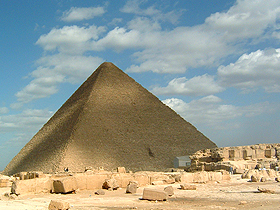When Allah commanded the Prophet Musa (as) to communicate His message to Pharaoh, Musa (as) asked for his brother Harun (as) to accompany him. Musa’s (as) wish was granted by Allah. Allah declared that Harun (as) had been allowed to accompany Musa (as) in order to support him in his mission to Pharaoh as well as during his struggle with his people. After Allah rescued the Prophet Musa (as) and his adherents from Pharaoh and his soldiers, Musa (as) left his people for sometime, leaving them in the care of Harun (as). However, disbelievers among the tribe of the Prophet Musa (as) took advantage ofis absence; under the leadership of a hypocrite called Samiri, they made an idol in the shape of a calf and began to worship it.
Harun (as), In An Effort To Save His People
From Corruption, Reminded His People
That Their Real God Was Allah
Harun had earlier said to them, “My people! It is just a trial for you. Your Lord is the All-Merciful, so follow me and obey my command!” (Surah Ta Ha, 90)
However, saying that they would worship the calf until the Prophet Musa (as) returned, his people insisted on denial:
They said, “We will not stop devoting ourselves to it until Musa returns to us.” (Surah Ta Ha, 91)
During his stay on the Mountain of Tur, the Prophet Musa(as) was informed by Allah about his people’s situation. Musa(as) thereupon returned to his people. The conversation between the Prophet Musa (as) and Harun (as) is quoted in the Qur’an as follows:
When Musa returned to his people in anger and great sorrow, he said, “What an evil thing you did in my absence! Did you want to hasten your Lord’s retribution? "He threw down the Tablets and seized hold of his brother's head, dragging him towards him. “Son of my mother,” said Harun, “the people overpowered me and almost killed me. Do not give my enemies cause to gloat over me. Do not include me with the wrongdoers.” He[Musa] said, “My Lord, forgive me and my brother and admit us to Your mercy. You are the Most Merciful of the merciful.” (Surat al-A’raf, 150-151)


